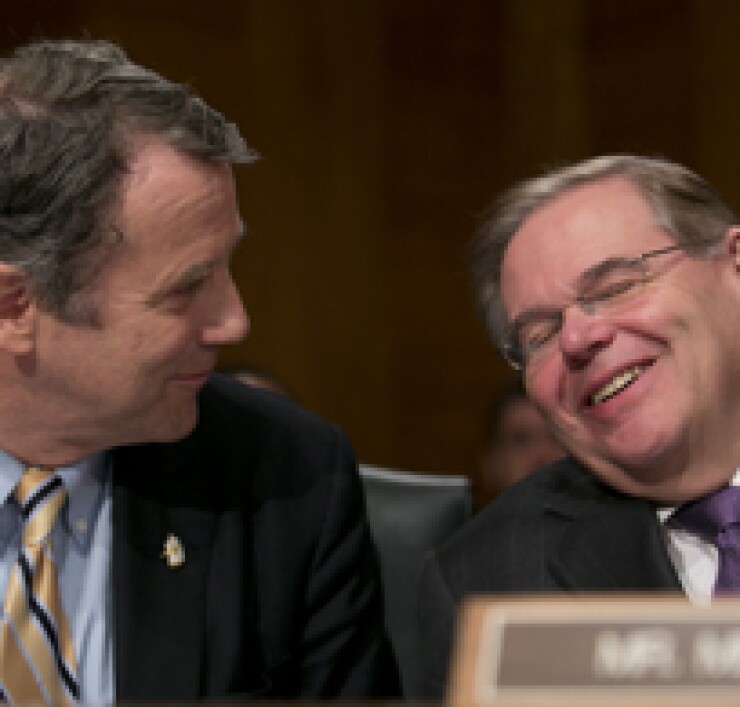
The chance of any housing finance reform bill moving in Congress this year—as well as in the foreseeable future—is now seriously in question after six key Democrats have apparently rejected the plan offered by Senate Banking Committee leaders.
The six lawmakers—whose support was crucial in getting broad backing for the legislation authored by committee Chairman Tim Johnson, D-S.D., and top Republican Mike Crapo, R-Idaho—were said to be on the fence. But now that they have reportedly given thumbs down for the plan, observers said the bill is likely doomed even if the committee passes it by a slimmer margin.
"The likelier scenario is that this passes with 12 or 13 votes and dies a quiet death," said Brian Gardner, a policy analyst with Keefe, Bruyette & Woods. "The principals and [Department of Housing and Urban Development] Secretary Shaun Donovan may give an occasional speech praising the bill and creating momentum, but behind scenes it doesn't go anywhere. By late July people realize it’s over and finished for 2014, and they turn their attention to other matters."
The committee is still said to be
With Johnson stepping down next year, the committee gavel will pass to another chairman. That, combined with the distraction of midterm and then presidential election politics, could mean it is anyone's guess when momentum re-emerges.
"If Congress fails to enact housing finance reform legislation in 2014, we believe the odds are only 10% for adoption of the legislation in 2015 or 2016," said Jaret Seiberg of Guggenheim Securities in a client note.
Talks over the bill reportedly stalled out on Thursday after the group of six Democrats decided to oppose the legislation absent major revisions, according to several sources. The plan, which builds on earlier work by Sens. Bob Corker, R-Tenn., and Mark Warner, D-Va., has enough existing bipartisan support from panel members to just pass it out of the committee, with a vote expected in coming days. Democrats' decision not to back the bill was first reported by
Lawmakers, staff, stakeholders and Obama administration officials had been negotiating in earnest for weeks leading up to an earlier planned April 29 markup. But that vote was postponed at the last minute in the hopes of bringing on several additional members.
Some familiar with the process expressed surprise at the abruptness of the decision by the six Democrats following what had seemed like productive discussions.
A Senate aide familiar with the talks said that lawmakers were "really close to a deal" before the group of Democrats decided together not to back the legislation.
"Every concern that was raised we’d found a solution for," the aide said, adding that the development suggests lawmakers in the Democratic caucus support preserving Fannie and Freddie. "It begs the question of whether some members are just completely satisfied with the status quo."
The lawmakers reportedly not supporting the bill include Sens. Jack Reed of Rhode Island, Charles Schumer of New York, Robert Menendez of New Jersey, Sherrod Brown of Ohio, Jeff Merkley of Oregon and Elizabeth Warren of Massachusetts. None responded to requests for comment on Friday.
A firm date has not been set to resume the markup, though before the six Democrats' decision was reported, committee staff were said to be targeting a May 15 markup date. It is now possible the vote could occur as early as Tuesday.
"Housing finance reform is going to pass out of the Banking Committee next week with bipartisan support, which is a landmark achievement for such a complicated and controversial issue. We have made significant progress bridging the divide among those previously undecided, and the committee vote is just a first step," said Sean Oblack, a committee spokesman in a statement Friday. "Those involved in the negotiations have indicated they are interested in continuing to work together to try and find common ground, so the Banking Committee will keep working after favorably reporting out the bill next week."
While the committee has left the door open for continued talks after the markup, the odds of the legislation getting time on the Senate floor remain very low without the support of more liberal Democrats. The bill is expected to pass with the coalition of Democrats and Republicans that originally backed the Corker-Warner legislation, along with the banking panel leaders. Support from Sen. Tom Coburn, R-Okla., is also a possibility.
And looking out over the foreseeable future, the odds for final passage of legislative reform remain equally dim in the coming years. Johnson retires at the end of the year, and it is unclear that any of the possible successors, including Schumer and Brown, would be inclined to pick up the mantle. If Republicans win control of the Senate, it is likely that Sen. Richard Shelby, R-Ala., a conservative lawmaker, will take the gavel for his two remaining years as chairman under party rules. He is said to oppose the Johnson-Crapo plan.
"I wouldn’t call the framework dead, but it absolutely will not have the front-runner status when this issue reemerges again that some thought it did in the intervening period between the introduction of Corker-Warner and the release of Johnson-Crapo," said Isaac Boltansky, an analyst at Compass Point Research and Trading.




